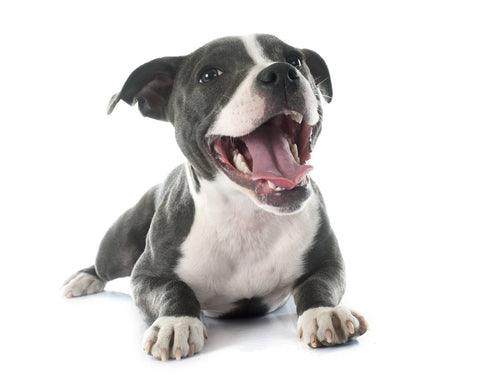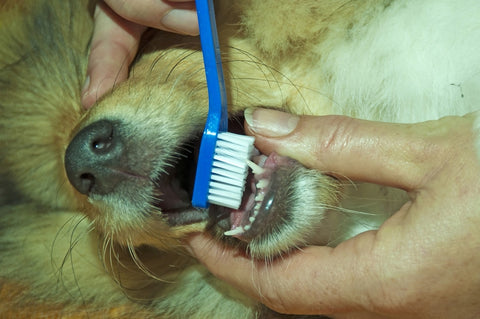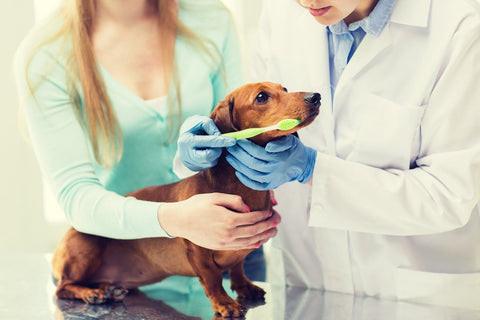Owning a dog is an incredibly rewarding experience. These loyal pets provide unconditional love, making them a welcome addition to any family. As a pet owner, you are responsible for making sure that your dog stays healthy and strong. Along with feeding him a balanced diet, making sure he gets plenty of exercises, and taking him to the vet for regular checkups, that also means looking after his oral health. Dog ID Collar covers all the important things to know when caring for your four-legged best friend’s teeth.
Dental care for dogs is extremely important. Problems with their teeth and gums can cause pain and can make it hard for them to eat. More than that, however, dental issues can also increase their risk of developing other health conditions such as heart disease.
The Importance of Dental Care for Dogs
Dogs have incredibly strong teeth and jaws. Like humans, they are born with a set of  baby teeth. Eventually, these teeth fall out and are replaced by stronger adult teeth. Altogether, dogs have 42 teeth. This is in contrast to humans, who typically only have 32 teeth. With dogs, the best way to keep their teeth and gums healthy is by brushing them. One common misconception about dogs is that chewing on objects like sticks or toys is enough to keep their teeth clean. Dental care for dogs is more than chew toys. While chewing does help, brushing removes far more plaque and tartar, significantly reducing the risk of oral health problems.
baby teeth. Eventually, these teeth fall out and are replaced by stronger adult teeth. Altogether, dogs have 42 teeth. This is in contrast to humans, who typically only have 32 teeth. With dogs, the best way to keep their teeth and gums healthy is by brushing them. One common misconception about dogs is that chewing on objects like sticks or toys is enough to keep their teeth clean. Dental care for dogs is more than chew toys. While chewing does help, brushing removes far more plaque and tartar, significantly reducing the risk of oral health problems.
When Should I Start Dental Care for Dogs?
The best time to start brushing your dog's teeth is when he is young. Getting a puppy used to have his teeth touched and brushed is a lot easier than working with an older dog.
No matter how old your dog is, however, it is never too late to start brushing. The key is to go slowly. Never rush your dog when they are learning something new. With patience, you can teach even the most stubborn dog to enjoy having his teeth brushed. To get the best results, follow the steps Dog ID Collar has gathered below.
How To Brush Your Dog's Teeth
1. Invest in the right supplies
Before you begin, purchase a toothbrush and toothpaste specifically designed for use on dogs. You can find these products at any pet store.
WARNING: Never use human toothpaste when brushing a dog's teeth. It contains ingredients that are toxic to pets and can make your dog sick. Only use toothpaste that is specifically made for dental care for dogs.
 Finger toothbrushes are a popular option. Instead of having a long handle that you hold onto, these toothbrushes have an opening that allows them to slide over the tip of your finger. Most dogs are more accepting of having a finger put in their mouth than a long-handled toothbrush. Experiment with your pet, however, to see what works best.
Finger toothbrushes are a popular option. Instead of having a long handle that you hold onto, these toothbrushes have an opening that allows them to slide over the tip of your finger. Most dogs are more accepting of having a finger put in their mouth than a long-handled toothbrush. Experiment with your pet, however, to see what works best.
2. Get your dog used to having their mouth touched
Don't jump right in with the toothbrush and toothpaste. Instead, start by getting your dog used to having his teeth and gums touched.
Begin by slowly petting him on his muzzle. Once he is used to that, try running your finger gently over his teeth. Take things slowly. If your dog shows any signs of discomfort, stop and try again later. It may take several days or a week before they become comfortable with you touching their mouth.
At this point, you can introduce the toothbrush. Again, take things slowly, giving them a chance to sniff the toothbrush and get used to having it near their mouth. Once they are comfortable around the toothbrush, you can try using it to brush their teeth. Toothpaste for dogs is usually chicken, beef, or turkey flavored, which helps make dental care for dogs seem like more of a treat.
3. Use the right brushing technique
To brush your dog's teeth, start with the teeth at the front of his mouth. Move the brush gently up and down over the front of the teeth, slowly working your way toward the back. Repeat the process on the other side, ensuring that all of the teeth have been brushed as thoroughly as possible.
If your dog balks or shows any signs of discomfort, stop the brushing session and try again later. At first, you may only be able to do a few teeth at a time before you have to stop. Over time, however, he will become much more comfortable with having his teeth brushed. Once both of you are used to the process, it should only take a few minutes to complete dental care for dogs. Try to brush your dog's teeth several times a week to keep them as clean as possible.
Dental Care for Dogs - More Tips
Along with brushing your dog's teeth, there are other tricks that you can use to fight plaque and tartar. Try some of these suggestions:
– Purchase dental treats for your pet. These treats are usually designed to loosen plaque on the teeth while at the same time freshening your dog's breath.
– Try using a canine dental water additive. Adding these types of colorless, flavorless liquids to your dog's water can help reduce the number of bacteria in their mouth, minimizing plaque buildup on their teeth.
– Give them chew toys. Dogs usually love to chew on toys. There is special dental care for dogs' toys on the market that have rubber knobs or textured surfaces that are designed to loosen plaque and tartar on your dog's teeth while they chew.
All of these techniques can lead to better oral health for your pet when they are used in combination with regular brushing and periodic checkups at the vet.
Dental Care For Dogs At The Vet
 Along with brushing your dog's teeth at home, you should also take them to the vet regular checkups. When you take your dog in for his annual checkup, the veterinarian will usually check his teeth for signs of problems. Based on what they find, they may recommend having his teeth professionally cleaned. With this process, your dog is dosed with anesthesia. While he is asleep, his teeth are then thoroughly cleaned, removing any tartar that has built up near the gums.
Along with brushing your dog's teeth at home, you should also take them to the vet regular checkups. When you take your dog in for his annual checkup, the veterinarian will usually check his teeth for signs of problems. Based on what they find, they may recommend having his teeth professionally cleaned. With this process, your dog is dosed with anesthesia. While he is asleep, his teeth are then thoroughly cleaned, removing any tartar that has built up near the gums.
Following this dental care for dogs guide is the best way to keep your pet's teeth and gums healthy at any age. And help to reduce the chance of other health issues caused by oral hygiene problems. Make sure, along with dental care, that your furry best friend has the proper pet identification products as well. Dog ID Collar is the perfect place to shop for embroidered dog collars and leashes!
